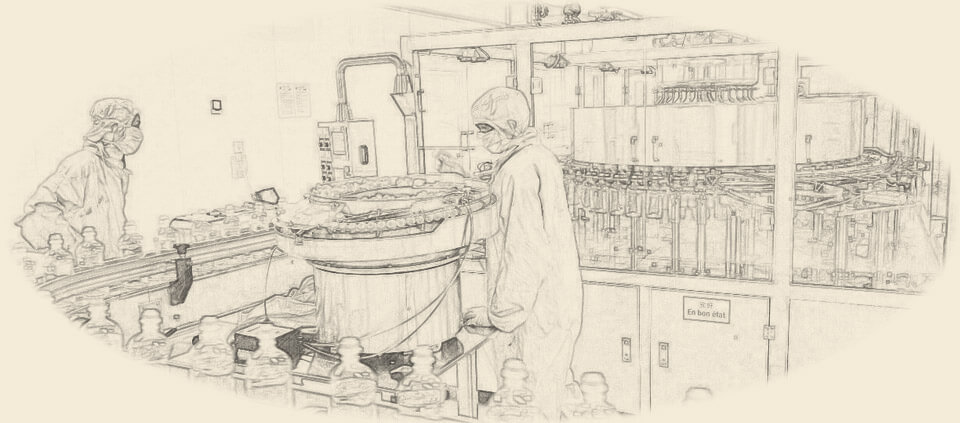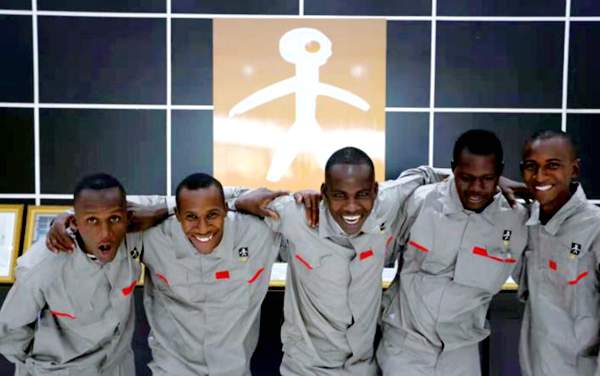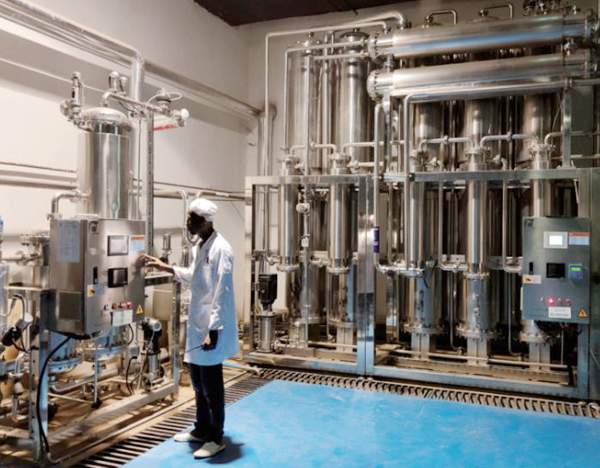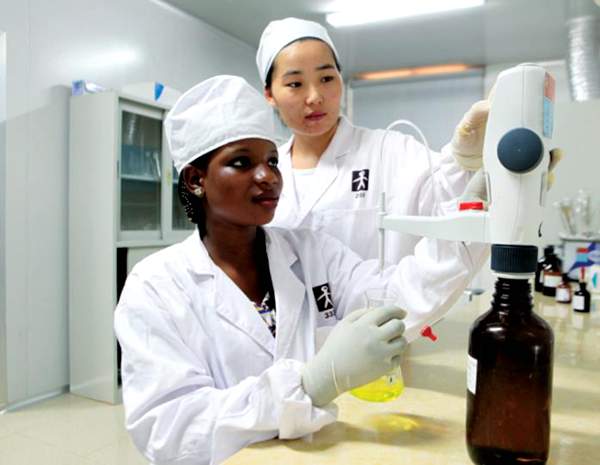Humanwell's "Made-in-Mali" Drugs
by Ma Li Wenbo
[Mali] Oumar Ba
Due to its weak industrial base and almost zero medicine manufacturing, the West African nation of Mali had its drug market monopolized by expensive imported drugs in the past. It caused a low overall level of drug use with frequent shortage of medical supplies and services.

Then in 2015, Humanwell (Africa) Pharmaceutical S.A. built a state-of-the-art factory in capital Bamako with the highest construction standards in West Africa and began making drugs locally. As Malian President Ibrahim Boubacar Keita said, "Humanwell put an end to the history that Mali couldn't make medicine, and will benefit Malians."
Making Drugs Affordable
Medical and health problems were a pressing issue in Mali and a key cause of economic underdevelopment.
To address this, at the Summit of the Forum on China-Africa Cooperation in Johannesburg, South Africa in December 2015, a total of 10 cooperation plans were put forward, including a China-Africa public health plan to support drug production by Chinese enterprises in Africa to increase Africans' access to medicines.

Local employees of Humanwell (Africa) Pharmaceutical S.A.
Humanwell set up the first pharmaceutical factory in Mali to produce drugs locally. The factory is a hub of activities. Its busy production lines run at high speed and the warehouse is full of neatly stacked pharmaceutical boxes labeled in both Chinese and French. Modern and well organized with workshops and clearly divided operation areas, the factory is surrounded by crisscrossing asphalt roads to make the transport of the medicines and raw materials easier.
It primarily produces medicinal syrups, suspensions and large volume injections. These are basic drugs that are difficult to transport and don't have a high profit margin, the reason why the local businessmen were unwilling to import them in large quantities. Consequently, these medicines used to be in short supply in the past. But since Humanwell's factory started running, three production lines of oral liquid formulations, large volume injections and solid preparations are in operation, significantly easing the shortage of medicines in Mali as well as in the neighboring countries.
Malians are happy that the local drug production by Humanwell has cut down the prices of syrups and large volume injections by 30 percent on the Mali market.
The factory supplies quality medicines at low prices and has made it easier to buy drugs, strengthening medical care in the country. Humanwell and Mali's Ministry of Health have also jointly established an anti-malaria center to give free treatment and nutritional food to local patients.
Humanwell's contribution to strengthening the ties between China and Mali and its role in improving the health of Malians has been recognized by the government of Mali. In 2018, the government awarded the National Order of Mali medal to the company's general manager. It is the country's highest honor for foreigners, except heads of state.
Quality African Drugs
In 2015, the Quality Control Center at Mali's National Laboratory, which tests drugs, especially imported drugs in the past, received test samples of the ibuprofen syrup locally produced by Humanwell. Since the medicine was made in Mali, the officials at the center suspected it would be inferior in quality.
However, the medicine passed the evaluation test. The still suspicious officials thought it was probably because they had done a routine test with fewer indicators. So to double check the quality of the samples, the center secretly sent them to quality control centers in France and Canada for detailed testing.
When results came back a week later, the staff couldn't believe their eyes. The samples had passed all the evaluations using more indicators!
Producing quality drugs requires high-standard manufacturing practices. To ensure that, Humanwell asked the experienced Wuhan Pharmaceutical Industry Design Institute in central China to design the entire layout and production process of the factory. Subsequently, the factory was equipped with the recommended production, testing and storage facilities to ensure it met the quality control requirements for modern pharmaceutical production.

Local staff checking modern production equipment
Inside Humanwell's workshops, it is a busy scene. The assembly lines are manned by the local staff. Some are intently monitoring the machines at the workshop where the injections are bottled to see if they are running properly and making frequent notes. Others are taking the medicine bottles coming off the assembly line and packing them into cartons and then wheeling the cartons, once they are full, to the cold storage nearby on a trolley.
The machines hum away and the staff busily moves about in the spotlessly clean workshops. From one end of the production line to the other, everything is in good order.
Producing quality medicine also requires high-level technical operations. To ensure that, when the Mali factory started, Humanwell's headquarters sent 10 experienced workers from other subsidiaries to guide the locally recruited staff in Mali until they had mastered operating the production line. The operation manual was written in both Chinese and French and one local master worker was trained within a timeframe before he could then train the rest of the local staff. It took the company more than a year to complete the whole process. All this has ensured the standard of the operation.
Real "Made-in-Mali"
Most Western African countries lack a complete pharmaceutical industry chain. They don't have local factories, nor do they produce the raw and supplementary materials required for making drugs. The government of Mali hopes Humanwell will advance pharmaceutical industrialization in the country and help build a complete pharmaceutical industry chain.
Humanwell's Mali factory not only manufactures drugs locally but is also promoting a localized supply chain. It sources the packaging materials, including cartons, labels and syrup bottles, locally. In addition, it is attracting foreign companies making packaging materials to invest in Mali. The drugs made by the factory are distributed in Mali as well as in neighboring countries, boosting the development of logistics in Mali.
It is essential to have local human resources to achieve all this. As the local workers in Mali lacked pharmaceutical production experience and had a weak technological base, Humanwell's Mali factory has stepped up training of its local personnel.

A Mali worker studying pharmaceutical technology
Jamati, who is in his early 30s, used to be a construction worker. It earned him little money and the income was unstable. On hearing Humanwell was building a pharmaceutical factory, Jamati went there to look for work. He had to register, then received training and was hired on probation. After completing the probationary period, he has become a member of Humanwell. The factory has given him a lot of learning opportunities. It took him only three years to grow from a worker into a first-line manager adept at technology and speaking fluent Chinese.
Now, as a first-line manager, Jamati is responsible for process management and equipment maintenance. His busy daily schedule looks like this:
7:50 a.m. - 8:00 a.m.: assigning tasks to workers, arranging repair and cleaning of equipment;
8:00 a.m. - 8:30 a.m.: going to the power supplying company to get the electricity bill and verifying it;
8:30 a.m. - 10:00 a.m.: going to the equipment room to check and supervise operation;
10:00 a.m. - 11:30 a.m.: shutting down some of the machines, overseeing that the processes stop one after another;
11:30 a.m. - 12:00 noon: shutting down all the machines;
12:00 noon - 12:45 p.m.: midday break;
12:50 p.m. - 1:00 p.m.: rebooting the machines;
1:30 p.m. - 3:00 p.m.: monitoring water purification;
3:30 p.m. - 4:30 p.m.: recording fuel consumption, how long the machines were run, and the service conditions of the boilers and vehicles;
4:30 p.m. - 5:00 p.m.: checking the staff 's work for the day, confirming attendance, closing the door and turning off the power.
Jamati feels very proud talking of the factory's work: "We make quality drugs that everyone can afford," he said.
Currently, more than 200 local employees like Jamati work in the factory, producing over 40 kinds of medicines, which are "made-in- Mali".
According to the United Nations' 2030 Agenda for Sustainable Development, by 2030, universal health coverage should be achieved, including "access to safe, effective, quality and affordable essential medicines and vaccines for all". Malians are running fast toward this goal. They have their own "made-in-Mali" drugs and are no longer daunted by the thought of medicines being beyond their means.
FOR MORE
Project Overview:
Humanwell (Africa) Pharmaceutical S.A.'s Mali pharmaceutical factory, the first such modern factory in West Africa, was put into operation in January 2015. It has been highly praised by President Ibrahim Boubacar Keita of Mali and the drugs it produces have been welcomed by the local people.
The 19,000-sq-m factory makes 15 million bottles of oral liquid formulations, 20 million bottles of large volume injections and 400 million tablets and capsules annually. Its products fall into three categories: syrups, oral suspensions and large volume injections. At present, it has approval to make more than 70 kinds of drugs that have wide clinical application. The large modern pharmaceutical factory is among the organizations with the highest technical standards in West Africa.


